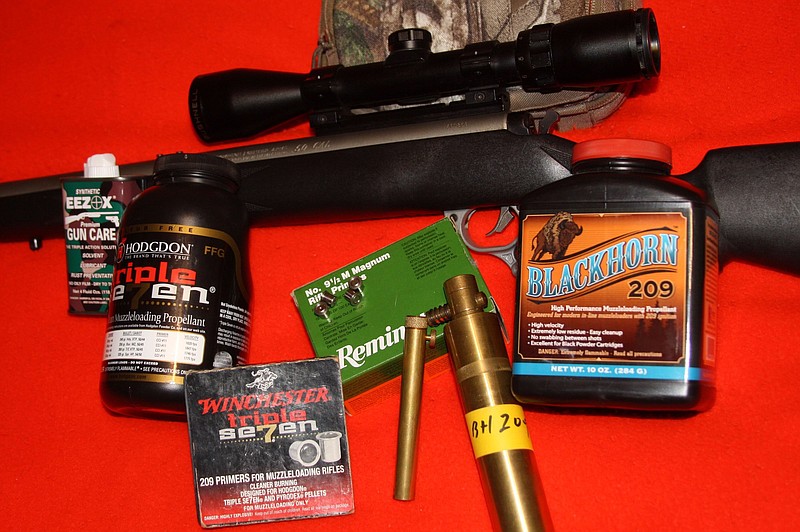Cool mornings lately inspire thoughts of slipping out and bagging a deer with a muzzleloader.
If you are one of those dreamers, then your time will come Saturday when muzzleloader deer season opens statewide across the Natural State. It runs through Oct. 24, and hunters can kill their entire season bag limit with muzzleloading firearms if they choose.
For all it encompasses, muzzleloader deer season is my favorite deer season. Of course, nothing compares with the excitement that surrounds opening day of the modern gun deer season, but muzzleloader season is a world unto itself. Mornings are cool, almost cold, but not uncomfortable. Acorns are falling, and the leaves of the hardwoods are slowly beginning to change. A lot of leaves have already fallen, so you can see through the woods farther than you could two weeks ago.
It hasn't rained much, so the forest floor is dry. You can hear a deer's footsteps in the brittle leaves from afar. The slow shuffle of doe hooves sound a lot different than the purposeful stride of a buck.
You will still get fooled, though. A squirrel rooting around in the leaves can sound like a herd of deer, and an armadillo sounds like a herd of buffalo. Even little wrens bobbing around in the leaves will keep you wound as tight as an eight-day clock.
Years ago, I tried using electronic "game ears." They're merely hearing aids marketed to hunters, with camo earpieces, of course. Once was enough for me. They made even falling leaves sound like pterodactyls landing. My head swiveled and darted all day, and my nerves were on razor's edge. By the end of the hunt, I was exhausted.
You have to be edgy, though, because mid October is an excellent time to encounter a mature buck. They spend a lot of time cruising their territories checking scrapes, which is a deer's equivalent to a dating app. A deer makes a post by scraping clean a place in the dirt, usually under a single, low-hanging limb and leaving scent.
Deer are putting on fat and growing out their winter coats right now, so they spend the hot hours bedded down in protective cover. In October, I usually see them in the last 90 minutes of daylight, and mostly in the last 30-40 minutes. They are moving fast and are not interested in food. When you hear one approaching, you'd better be ready because he will not present a lingering opportunity.
Does, on the other hand, are all about food. They are also most active in the late afternoon and evening, and they frequent feeders and food plots with railroad reliability. They roam the woods in family units. They move slowly, browsing. You might see a doe and two yearlings or three or four does and yearlings. They are usually calm, and while they do inspect box stands, they don't spook if you are still and the wind favors you.
I have one stand that has been productive in muzzleloader season since 2009. For the first few years, deer always arrived in the morning at about 8 a.m. For the last four or five years, they've come in the evenings.
There are all kinds of muzzleloaders to suit any hunter's preferences. You can build a traditional flintlock muzzleloader from a kit and hunt with blackpowder and patched round balls, or you can use a modern design that ignites more modern, more powerful propellants with shotgun primers. Or, you can go somewhere in between and use a plunger style model that ignites blackpowder or Pyrodex with percussion caps.
You can spend a lot of money on a premium muzzleloader, or you can spend a little on an introductory model at a big box store. They all work very well.
The selection of bullets varies. Modern muzzleloader bullets are spitzers with polymer tips that help make them more aerodynamic. With the right powder charge, they are accurate and lethal to distances that were once reserved for centerfire rifles.
I hunt in cozier environments, so I prefer hollow point bullets from Nosler, PowerBelt and Barnes. I like them better than tipped bullets because they seem to expand more reliably, and deer shot with them don't run as far, if they run at all.
When you find your deer, check it immediately on the Arkansas Game and Fish Commission's mobile app. If you do not have cell service at the kill site, tag the deer before transporting it.
Days are still hot, so take care of your deer to prevent spoilage. Field dress it immediately and skin it as soon as possible to allow the carcass to cool faster. Ideally, you will process your deer quickly after shooting it. If you must wait or if you intend to drive a long way, stuff bags of ice in the body cavity.
If you shoot your muzzleloader, clean it the same day. Blackpowder especially and blackpowder substitutes are very corrosive. They will ruin a rifle bore very quickly. Remove it and treat your clean bore with a light coat of Bore Butter.
Killing a deer with a muzzleloader gets you a third of the way to a Triple Trophy Award from the Game and Fish Commission. The AGFC gives the Triple Trophy Award to hunters that kill at least one deer with archery equipment, muzzleloaders and modern gun.
Safety is the most important consideration. Do not climb a tree without strapping yourself to the tree with a safety harness and lifeline. Keep your muzzleloader pointed in a safe direction at all times and be certain that your target is a legal deer before aiming.
Take photos and share them with Arkansas Democrat-Gazette readers by emailing them to bhendricks@arkansasonline.com. Include the hunter's name, date of the hunt, county where the deer was taken and any other details that will help tell the story.
